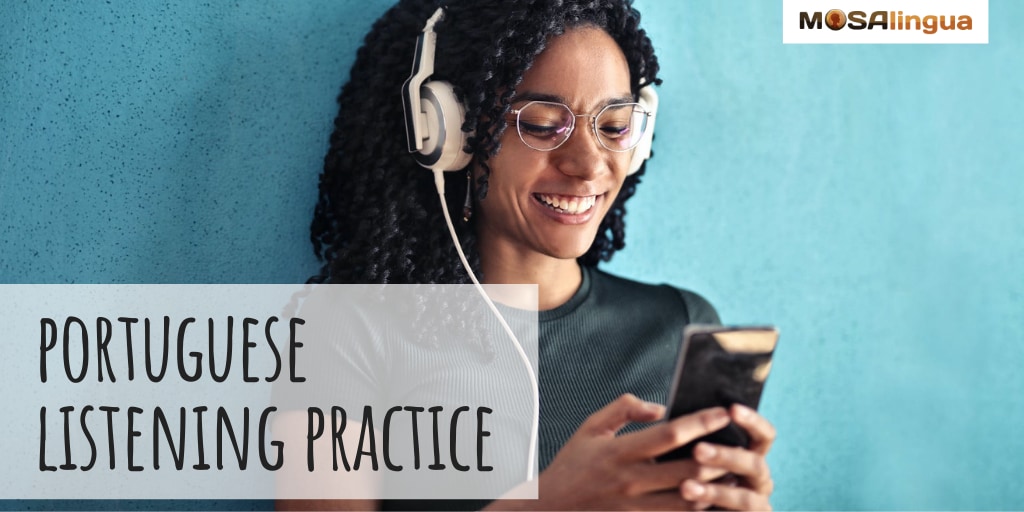If you want to learn Portuguese, listening comprehension is one of the most important skills to work on. Brazilian Portuguese is a vibrant language that dances, sings, and has a life of its own. But Brazilian speakers also have a thicker accent than speakers from Portugal, which can make things tough for learners. This means that authentic Brazilian Portuguese listening practice is essential.

Fun Brazilian Portuguese Listening Exercises for Practicing Comprehension from the Comfort of Your Home
You don’t need to book a ticket to Rio de Janeiro, Curitiba, or Fortaleza to practice listening to and understanding Brazilian Portuguese. In this article, explore all of the different ways you can practice listening comprehension at home! That’s right: TV shows, movies, podcasts, and music aren’t just entertainment. They can also help you better understand Brazilian Portuguese. Find out what kind of Portuguese audio to listen to, and how to listen in Portuguese to get the most out of your listening activities.
Watch TV shows to understand Portuguese
As surprising as it sounds, watching foreign-language TV shows is more than just a fun pastime! If you make it a habit, it can help you improve your language skills. It’ll help your ear get used to hearing Portuguese, understanding accents, and connecting the written language with its pronunciation. You’ll also hear new expressions, see common gestures and body language, and become familiar with a country’s way of speaking (or even a certain demographic group – young people, adults, etc.). It’s a great exercise for Portuguese listening practice, and we highly recommend you give it a try.
Warning: watching episodes of Brazilian TV shows with English subtitles (or—we shudder to think—dubbed) defeats the purpose. We’re sorry to say it, but someone has to! You have to immerse yourself in the language for the exercise to be worthwhile.
Even if you’re a beginner, we recommend watching TV shows in their original language (Brazilian Portuguese). If you want, you can start by watching with Portuguese subtitles. Even if you don’t understand anything or if you miss out on certain words, that’s fine. It’s normal, and it’s not a big deal. The longer you work at it, and the more you supplement exercises like this with vocabulary and other skills, the more progress you’ll see. It might be slow, but you’ll definitely make progress. You just have to be patient with yourself as you learn.
So if you really want subtitles, start with them in Portuguese. Then, after a month or two, stop using them to really get the most out of the exercise.
Tips on how to watch TV in Portuguese:
- If you come across an expression or a word you don’t understand, press pause, replay it, and write it down in a notebook or on your phone. First, try to figure it out using context. But if you get stuck, you can look up the meaning later (that’s why you wrote it down). Try to avoid looking it up right then, because you’ll interrupt the show and distract yourself from your listening exercise! When you come back to it later, you can make a list of new words and expressions learned from TV shows in your MosaLingua Learn Portuguese app (or a notebook).
- We encourage you to start with shows that have short and accessible episodes. Or even better – a show you’ve already seen, or whose plot you’re already familiar with. Portuguese listening exercises are meant to be fun, but they can also be tiring for beginners, so don’t push yourself too hard. Start with what you can handle. Of course, Brazilian movies are there for more advanced learners!
Listen to podcasts for Portuguese listening practice
Podcasts are audio recordings that focus on a wide variety of topics and are great tools for Portuguese listening practice. You can find them in nearly any language, including Brazilian Portuguese. Depending on your level, you should seek out slightly different podcasts. As for intermediate and advanced learners, you have lots of options. We encourage you to check out podcasts on subjects that interest you. If you are an entrepreneur, listen to a business-focused podcast in Portuguese. If you’re a huge sports fan, there are some great Brazilian podcasts on that topic.
Minor complication: unlike TV shows, most podcasts don’t have the benefit of written materials to help you when you get stuck. So if you are a beginner, opt for podcasts about learning Portuguese. They are usually created by teachers who know how to best help learners understand Portuguese audio, and with beginners in mind. For example, they speak at a reasonable speed, use simple structures, and introduce new vocabulary gradually. They often include short, easy exercises, dialogues from daily life, etc.
The key is to find a podcast that makes you want to keep listening—and therefore keep learning. We’ve picked out a few podcasts that we especially like for Portuguese learners. Check them out, maybe you’ll find one that’s a good fit to help you understand Portuguese better!
And again, here are a few tips:
- Like before, write down words and expressions that you don’t understand.
- Try to use context to figure out what they mean (pause, replay a few times).
- If you still don’t understand, move on and look them up later (these are our favorite Portuguese dictionaries).
- When the exercise gets tiring, stop for a while. In order for the exercise to work, it has to stay fun!
Portuguese karaoke with Brazilian songs
I’m sure many of you chose to learn Brazilian Portuguese because of its musical culture—to learn more about it and finally understand the lyrics to your favorite songs! Brazilian musical culture is huge, and very rich. Brazil has tons of musical styles, each more exciting than the next. You can use this diversity to work on your Portuguese listening practice. The more songs you listen to in Portuguese, the more your ear will get used to the language.
We’re working on a list of songs that are great for learning Brazilian Portuguese. If you have any suggestions, let us know in the comments! In the meantime, you can find tons of Portuguese music with a quick Google search. When you find a *bop*:
- Listen to it once without any help.
- Listen again, pausing and rewinding over passages you have trouble understanding.
- Read the lyrics. Today, this is super easy: all you have to do is type in the name of the song, the artist, and “lyrics” in your search engine, and you’ll find the words in their original language. If you still have trouble with some words, don’t hesitate to look them up online or in your MosaLingua app so you can hear them pronounced outside of the song. The website Forvo allows you to listen to the pronunciation of certain words recorded by native speakers. Again, try to understand using context first, but don’t make the exercise a chore. If you can’t figure it out, it’s okay to look it up.
- Once you find an album or artist you like, listen as often as you can! Of course, we encourage you to broaden this list to include songs from all the musical styles you enjoy. These are fun Portuguese listening exercises that are very easy to do at home.
Free websites, videos, and online exercises
Finally, it’s easy to find resources and tools online that you can use for Brazilian or European Portuguese listening practice.
- We put all of the best online resources for learning Portuguese in one place. Our list includes sections on listening comprehension, but also on reading, writing, speaking, grammar, and more.
- YouTube is a great source for audio content to help you perfect your Portuguese listening skills. We created a list of our top 5 favorite YouTube channels designed for Portuguese learners.
MosaTip: Make sure you subscribe to the MosaLingua YouTube channel. We release new videos with language-learning tips every other Tuesday.
- Lingua.com offers audio recordings in Portuguese. After you listen to the recording, the site asks comprehension questions (in Portuguese). You can answer them to make sure you’ve understood. It’s kind of an academic-style exercise, but it can help you work on your listening comprehension. The voice is computerized, which is disappointing and makes it a little more difficult. However, the Portuguese listening exercises themselves are well designed.
So, do you feel like you’re ready to make some progress learning Brazilian Portuguese? Be sure to check out some of our other articles that might be helpful:
- Brazilian Portuguese Slang you need to know if you want to sound less like a learner, and more like a native speaker
- 11 Good Reasons to Learn Portuguese
- Is Portuguese Easy? (The answer might surprise you!)
Related posts:
Want to start improving your language skills today?
Start improving your Portuguese today
Want to improve your Portuguese?
Good news: we can help!
More good news: you can get started for free! With your free trial, you can test drive the most effective method for learning Portuguese for the next 15 days !Vocabulary flashcards, videos with subtitles, audiobooks, articles adapted to your level – with MosaLingua Premium (Web & Mobile), you’ll have access to all this and more. Get started right now. It’s free—and risk-free—to try!






Comments